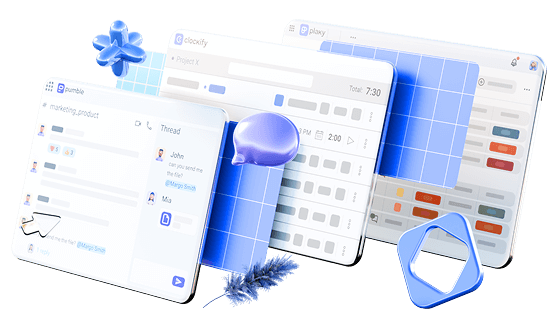Are you tired of working and constantly feeling you haven’t done enough?
What if we told you that it’s possible to train your brain to produce brilliant ideas, or not lose focus amidst a lengthy report?
We’ve had the absolute pleasure of talking about productivity with Dr. Mithu Storoni, a neuroscience researcher and the author of the Hyperefficient book.
During our conversation, and in her book, she revealed all the methods and strategies we can use on an everyday basis to become as productive as we’ve ever been before.
- Productivity used to mean producing quantity, but now it means producing quality.
- Dr. Storoni advises us to work according to the power law, where periods of high-intensity work are followed by rest periods.
- Being physically active stimulates the brain and enhances memory.
How has productivity changed over the years?
In her book Hyperefficient, Dr. Storoni explains that productivity used to mean producing a large number of items, such as cars, fridges, or anything else from an assembly line. This type of productivity was imperative during the Industrial Revolution. But, ever since the unstoppable growth of knowledge work industries, the notion has changed, and now the emphasis is on our minds:

“Now we’re in this new era of the digital economy, and the information age, the digital age. In this era, the goods we are producing come from our minds — productivity now means not producing quantity, but producing quality.”
Producing quality essentially means coming up with innovative ideas, according to Dr. Storoni. And for this, we need to use our brains in a way that encourages creation, imagination, and focus.

Expert tips for increasing productivity
To be truly productive, we need to know how to work, rest, and focus on a high level. Learn how you can improve all of these aspects for the best results.
Work in 90-minute cycles
Have you ever wondered why lectures and workshops usually last for 90 minutes? It’s because our brains function in approximately 90-minute cycles, which are followed by a break, known as the Basic Rest-Activity Cycle.
Dr. Storoni also believes that we should work in 90-minute sessions, and provides us with useful advice on how to do it best:

“If you have multiple tasks to get done during a single session, it helps to rank them from taxing to easy and do them in that order. On this basis, each work session would look something like this: perform the hardest tasks in the first twenty minutes, do slower, easier work for the remaining forty to seventy minutes, take a break for ten minutes. Repeat.”
The reason why we should spend the least amount of time doing hard work lies in the power law. The power law is a relationship between two quantities, where the rise in one quantity results in a decrease in another. Hence, the more intense the work is, the less time you should spend doing it.
The power law also implies following up on your high-intensity day at work with a couple of lighter days.
Further reading:
The Pomodoro technique is fantastic for setting up a timer and removing distractions to enhance your focus. Learn all about it here:
Raise your motivation levels to regain focus
It’s one thing to be productive when you’re feeling rested, motivated, and when work is your primary focus. But, how can you thrive when family, money, or love issues are hovering over your head, or you’re simply feeling low?
How to strengthen your mind when being productive is not high on your list of priorities?
When you’re feeling low and somewhat sad, you need something to raise your motivation for work. According to Dr. Storoni, coffee, tea, or listening to happy music are most likely all that you’ll need to regain focus:

“This gives you the boost, because when you feel more alert, it feeds into the part of the brain that deals with reward and motivation and pleasure. So when you feel more alert, it also makes you feel slightly better, happier.”
On the other hand, when you’re experiencing defensive sadness, such as the case during a divorce, illness, or the fear of the company going bankrupt — you need to regain your sense of control.
This can include going to the gym, tidying, making something with your own hands, and surrounding yourself with something familiar.
Another piece of advice that Dr. Storoni offers here is to avert your thinking:

“You focus on the things where you have control, you focus on the things where you have a sense of self-worth, you focus on the things that are certain.”
Further reading:
We spend a third of our day at work, so it’s vital to tend to our emotions first, and only then focus on the work ahead of us:
Remember: different types of tasks require different types of breaks
We often hear the take a break advice, but the trick is to use the break in a way that will regenerate your brain after doing deep work.
Dr. Storoni clarifies that there are two types of breaks that you should have, depending on the state in which you are after work. The first type of break is when you’re just exhausted, but not stressed out:

“If your work has been non-emotional, so you’re not kind of emotionally worriedor stressed — simply doing nothing is best. In nature, where your environment is quiet, low stimulation, low engagement, that kind of break is great.”
The second type of break is when you’re doing something intense, working toward a deadline, and you’re emotionally attached and need to reset:

“In that sort of scenario, when you leave your chair, your brain has not left its chair. The first few minutes of that break have to involve distracting your mind away from the work you were doing. So do something really, really engaging, really absorbing, so that even for just a few moments, you’ve forgotten that you were working. Once you’ve disengaged your mind, you can allow yourself to rest.”
For example, you can play your favorite song that cheers you up, or practice learning new skills, such as playing an instrument.

Enhance your focus on monotonous tasks by multitasking
We’ve all been there. Doing work that is important but gets monotonous — even boring — and our minds begin to wander, and we simply can’t focus.
Dr. Storoni gave us a surprising solution, which is to start multitasking:

“So what works really well is to do the opposite of what the whole world tells you not to do, which is multitask, actually. So you can do your boring thing on this screen and on the side, you can do something else. Anything that gives you pleasure, that stimulates you a little bit.”
So, you can turn on the music, chat with your colleagues, listen to a productivity podcast, or whatever it is that you can switch to from the primary task to raise your alertness.
How can business owners and managers encourage better productivity in the workplace?
The big question is how managers can implement productivity hacks to foster employee productivity.
Managers can have different approaches depending on what type of work their team is doing. For creative teams’ managers, Dr. Storoni suggests several things, such as avoiding meetings early in the morning:

“So, for everyone working on a team that is devoted to creativity, start work earlier. Do not put any first thing in the morning meetings. Really protect those first morning hours for creative work. If you have a brainstorming meeting, then go on a 20-minute walk before that brainstorming meeting. Give everyone the idea of what you’re going to brainstorm about.”
On the other hand, for teams that deal with administrative tasks, such as writing lengthy reports and analysis, Dr. Storoni explains that the most important hours are from the middle of the morning until lunchtime. So, avoid scheduling meetings at this time, as well as from the middle of the afternoon until early evening.
Another thing to foster productivity in employees is to enable them to have noise-canceling headphones or play white noise that will cancel out distractions.
Further reading:
Learn how to stay focused through these practical tips and tricks:
Additional habits that enhance your brain function long-term
Keeping our brain health at an optimum level is possible when we implement a few healthy daily habits:
- Exercising — being physically active stimulates the brain, and is great not just for our bodies, but also for mental functioning, as per research on exercise benefits.
- Learning new skills — learning something new can increase your cognitive skills, improve memory, and challenge your brain.
- Sleeping 8 hours a night — studies show that when your body gets enough hours of sleep, you prevent cognitive decline and enhance brain function, and an ideal number of hours of sleep is 7-9 in adults.
- Doing brain exercises — older adult or not, engaging yourself in jigsaw and crossword puzzles, helps you stay mentally active.
Further reading:
Learn how to keep your mind sharp as well as your body with these useful activities:
Train your brain to be productive and enjoy your work
Whenever possible, organize your tasks so that you work in 90-minute cycles. Handle the hardest part of your projects first, and then move on to less demanding ones.
Remember that we’re most creative first thing in the morning, and right before we go to sleep, and that a simple walk can bring about many innovative ideas.
But most importantly — use your breaks smartly. When you train your brain to work hard and reward it with a proper break, your work will flourish — and so will you.
How we reviewed this post: Our writers & editors monitor the posts and update them when new information becomes available, to keep them fresh and relevant.



